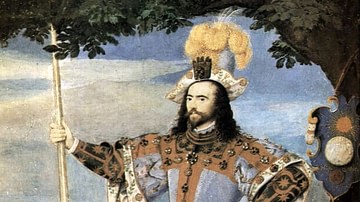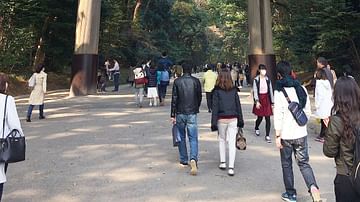Search
Remove Ads
Advertisement
Search Results

Definition
Meiji Period
The Meiji period refers to the period in Japanese history from 1868 to 1912 during which the Meiji Emperor reigned. Following the overthrow of the Tokugawa shogunate in the Meiji Restoration of 1868, Japan's new leaders embarked on a program...

Definition
Meiji Restoration
The Meiji Restoration was a political event that took place in Japan in 1868. In it, the Tokugawa family, a warrior clan that had ruled Japan for more than 260 years, was overthrown by a group of political activists who proclaimed that their...

Image
Emperor Meiji Moving from Kyoto to Tokyo
The palanquin and procession of Emperor Meiji moving from Kyoto to Tokyo through the Tokaido road. Drawing published on the 20 February 1869 issue of Le Monde Illustré, after a croquis by Alfred Roussin, French navy officer in Japan. National...

Article
Clothes in the Elizabethan Era
Clothes in the Elizabethan era (1558-1603 CE) became much more colourful, elaborate, and flamboyant than in previous periods. With Elizabeth I of England (r. 1558-1603 CE) herself being a dedicated follower of fashion, so, too, her court...

Article
Sports, Games & Entertainment in the Elizabethan Era
Leisure activities in the Elizabethan era (1558-1603 CE) became more varied than in any previous period of English history and more professional with what might be called the first genuine entertainment industry providing the public with...

Article
Food & Drink in the Elizabethan Era
Food and drink in the Elizabethan era was remarkably diverse with much more meat and many more varieties of it being eaten by those who could afford it than is the case today. Storage of food was still a problem and so fresh produce was grown...

Article
Education in the Elizabethan Era
Besides the traditional option of private tuition, Elizabethan England (1558-1603 CE) offered formal education to those able to pay the necessary fees at preparatory schools, grammar schools, and universities. There was, however, no compulsory...

Article
Holidays in the Elizabethan Era
During the Elizabethan Era (1558-1603 CE), people of all classes greatly looked forward to the many holidays and festivals on offer throughout the year. The vast majority of public holidays were also religious commemorations, and attendance...

Article
Clothing in the Victorian Era - Getting the Right Balance of Fabric, Figure, and Flashiness
Striking silhouettes, sumptuous fabrics, bright colours, frills galore, and all manner of ornate accessories define the clothing of the Victorian period, that is, during the reign of Queen Victoria, which spanned seven decades of the 19th...

Image
Torii Gate at Meiji Jingu Shrine in Tokyo
This is one of two entrances to the Meiji Jingu Shrine in Tokyo, Japan, which are marked by large wooden torii gates. At Shinto shrines in Japan, the torii demarcates the dividing line between profane and sacred spaces. At the Meiji Jingu...